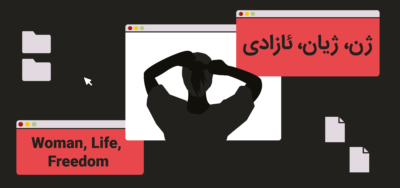Since the inception of the Green Movement and subsequent waves of protests, online spaces have consistently played a crucial role in driving the advancement of social movements in Iran. However, it can be argued that the nationwide uprising triggered by the tragic death of Mahsa Jina Amini marked a turning point, as it was the first instance where influencers and public figures in the online sphere assumed an undeniable role in disseminating the protests. The Islamic Republic took measures beyond blocking commonly used social networks in response to this development. Within a few months from the winding down of the national demonstrations, they embarked on a significant endeavor to restrict freedom of expression online and exert greater control over the content generated within this domain, surpassing their previous efforts.
In the wake of the recent protests, there has been a notable transformation in society’s response to the issue of hijab. This shift has been evident in the widespread resistance against compulsory hijab, offline and online. In response, the Islamic Republic has taken proactive measures, including claims of implementing “smart technologies” and automated systems, to address non-compliance with the compulsory hijab and to reduce direct interactions with citizens. Their objective is to amplify the consequences and costs of women defying the compulsory hijab.
In this report, we delve into two other matters: firstly, the regression of FATA Police to its original function of imposing individual restrictions, and secondly, its ongoing security clashes with online dissidents.
The Criminalization of Online Activities
On January 30, Hossein-Ali Haji-Deligani, a member of the Board of Directors of the Islamic Consultative Assembly (Majles), revealed discussions of a Bill aimed at dealing with individuals involved in spreading “propaganda”. Essentially, this plan emphasizes that individuals, irrespective of their position in either the physical or online domain, are forbidden from expressing opinions or analyzing matters until the authorities issue official statements. According to this proposed Bill, in cases where such incidents result in financial or personal losses and create insecurity, the defendant would be obligated to compensate damages up to twice the amount.
Just a few days after these statements, on February 2, Abolfazl Tahriri, Qom’s Deputy Prosecutor for Cyberspace Affairs, highlighted various “criminal actions” online. By citing examples, he asserted that liking, hashtagging, and being a member of online channels and pages could hold individuals accountable and result in punishment.
Regarding this issue, lawyer Kambiz Norouzi highlighted in an interview with Donya-e-Eqtesad newspaper that “liking an article does not carry a criminal definition in our legal system” and therefore does not constitute a punishable offense. He explained that liking does not involve expressing or publishing any content, so it is not considered legally objectionable.
However, on February 7, only a few days after the proposal was presented in Majles, an unnamed lawyer was on trial in a court in Dilijan city of Markazi Province for the sole act of liking posts on Manoto’s Instagram page. Manoto is a widely recognized Persian-language television network based in London.
The Iranian Regime’s Opposition to Advocates of Courage
During the period when street protests gradually subsided, a diverse range of individuals played a crucial role in fostering courage. Artists, athletes, social activists, and ordinary citizens contributed significantly to this endeavor. They achieved this by leveraging social media’s power to share dissent messages, openly appearing in public spaces without hijab, and distributing images that embodied their unwavering defiance. These actions effectively propagated a sense of bravery throughout the online sphere, helping to sustain the momentum of the movement. As expected, the government responded by summoning these individuals and issuing threats of punishment in an attempt to suppress their voices.
In December last year, a video went viral on social media, capturing an incident in Qom where a citizen entered a bank without wearing the compulsory hijab, seeking access to banking services. Following this event, the bank manager was swiftly terminated from their position for providing services to customers who did not adhere to the hijab requirement. On March 31, the HRANA news agency revealed that Maryam Banirazi, the individual featured in the video, who is a nurse,had been sentenced to 148 lashes, an eight-month prison term, and a two-year ban from government and public services due to her non-compliance with the hijab requirement.
During this period, Mahtab Nasirpour, Azadeh Samadi, and Mahtab Karamati, three well-known actresses were summoned to the Evin Prosecutor’s Office due to their online expressions criticizing the current situation. Furthermore, according to reports from BBC Persian, several dissenting artists, such as Taraneh Alidoosti, Asghar Farhadi, Kayhan Kalhor, and Mehdi Yarrahi, have been banned from conducting any transactions at the Deeds and Properties Registration Organisation of Iran.
Following the publication and circulation of her unveiled photo, Mozhgan Ilanlou, a writer and documentary filmmaker, faced severe legal consequences. She was given a sentence of 9 and a half years in prison, with 74 lashes and a monetary penalty.
During that same period, Reihane Taravati, a civil activist and photographer, faced legal repercussions as she was convicted and sentenced to five years in prison. The charges brought against her were related to the accusation of “assembly and collusion to act against national security.” Specifically, she was allegedly involved in “Inducing fabricated desires among women” through the advocacy of the Me Too movement” online.
“What’s the Point of Revolution if We Can’t Dance?”*
On March 8, International Women’s Day, a video emerged on social media platforms featuring Iranian girls from Tehran’s Ekbatan neighborhood dancing without hijab to the song “Calm Down” by Rema and Selena Gomez. The video quickly gained attention and provoked a response from the security forces operating in the area.
Initially, Ekbatan’s local events account announced on Twitter that the authorities had implemented measures to identify the girls in the video. They examined the surveillance footage and interrogated the dance group’s coach to collect relevant information.
Several days later, a video emerged of the teenagers, who seemed to be confessing under duress, expressing regret for sharing the dance video. This forced confession triggered a surge of sympathy online, prompting hundreds of individuals globally, to dance to the same song and sharing their videos using the hashtag #EkbatanGirls—this collective act of online solidarity aimed to support and unite with these teenagers.
In a similar incident, Astiyazh Haghighi and Amir-Mohammad Ahmadi, a famous blogger couple with more than one million Instagram followers, received a combined sentence of 10 years and six months in prison for sharing a dance video at Azadi Square. However, on February 17, they were granted amnesty, leading to their subsequent release from prison.
Legal Proceedings against Protesters Opposing Serial Poisonings of School Girls
The Tehran Prosecutor declared on March 7 that a lawsuit had been initiated against several celebrities who had voiced their opposition to the systematic poisoning of female students. This incident again highlights the government’s and particularly the judicial system’s persistent stance in addressing any form of critical expression. The authorities often use the excuse of combating “the spread of false information” to justify their actions.
Azar Mansouri, Reza Kianian, and Sadegh Zibakalam were among the individuals who expressed dissatisfaction with the judicial proceedings regarding this matter across multiple online platforms.
Unveiling and Legislation
There is an undeniable certainty that women in Iran will not return to the conditions before the Jina (Mahsa) uprising. The requirement of compulsory hijab, whether in public spaces or online, is widely disregarded by individuals who do not support the concept of compulsory hijab. These women form a substantial portion of Iran’s multicultural society. On the other hand, the government adamantly maintains the “mandatory hijab” as a symbol of its Islamic identity, asserting its “legal” status. Due to its inability to effectively tackle these law violations while avoiding any perception of indifference, the regime is now attempting to implement strategies that indirectly wear down opponents of the mandatory hijab. The objective of imposing substantial financial and moral penalties is to marginalize individuals who oppose the mandatory hijab without directly confronting them in the public sphere. It is only natural that some of these conflicts manifest online, and they often involve incidents that prompt the government to take action against individuals or even establishments that they perceive as transgressors in the real world.
A 7-Article Draft by the Cultural Commission of the Islamic Consultative Assembly to Address the Hijab Issue
During the general session of the Majles on March 14, Ahmad Rastineh, theSspokesperson for the Majles’s Cultural Commission presented the Commission’s monitoring report on the hijab issue to journalists. Rastineh highlighted that, due to inadequate legislation, “the absence of law and order in the online realm of our country now poses greater threats than the physical space, challenging the intellectual and moral boundaries of Islamic Iran.”
Bijan Nobaveh, the MP for Tehran further elaborated on this plan, stating that the police force and judicial officers would utilize cameras and other technological tools to gather evidence and identify individuals who violate the hijab regulations in institutions and entities governed by Article 5 of the Civil Service Management Law and Article 29 of the Sixth Five-Year Economic, Cultural and Social Development Plan. This includes public passages, places, vehicles, and online spaces. Once identified, the offenders will be subject to appropriate penalties as specified in the enforcement tables. He made it clear about the plan mentioned above that the “telephone and internet access of individuals not adhering to hijab” will be restricted or blocked.
Additionally, Hossein Jalali, the MP for Rafsanjan declared that individuals who do not wear hijab may be fined up to 3 billion tomans (estimated 62,000 USD). He further specified that prominent figures, such as celebrities and individuals with popular social media accounts or websites, may face an additional penalty of an Internet usage ban if they fail to comply with the hijab requirement.
The Judiciary and Ministry of Interior issued statements alongside this extensive crackdown, triggering a new wave of intimidation, threats, and actions targeting citizens who advocate for women’s autonomy in deciding their own clothing and veiling preferences.
Implementing Closures and Restrictions on Public Spaces and Businesses
On January 21, Mashregh News released an article about images of Digikala employees without hijabs circulating online while also expressing disapproval towards the internet service company. Keyhan newspaper, notorious for spreading unsubstantiated security narratives, republished the article, linking it to the aftermath of Mahsa Jina Amini’s death. They urged security forces to take action against internet companies that endorse the removal of the hijab.
The responses to these two reports were swift, as within a single day, Tehran’s Attorney Generalannounced an investigation into the matter. Additionally, a portion of Digikala’s response was made public, wherein the company’s Vice President of Legal Affairs asserted that there had been no unveiling of the hijab within the company’s premises.
In connection with this incident, a store in Shandiz Located in the province of Razavi Khorasan, was closed down because the shop owner supported a customer who chose not to wear a hijab and opposed an individual who was attempting to enforce “virtue.” Similarly, a tourist site in Dezful was also forced to shut down because it was accused of allowing entry to individuals who were not veiled. A video capturing people without hijab in this tourist complex during the Nowruz holidays spread widely.
From Moral Considerations to Security Focus: The Changing Disciplinary Actions of the FATA Police
The FATA Police’s disciplinary actions towards citizens primarily revolve around moral considerations rather than security ones. However, following the nationwide protests, we witnessed a shift in this approach. The FATA Police, utilizing their intelligence resources, focused on addressing the activism of ordinary people online and local protesters. As a result, there was a noticeable increase in arrests related to charges such as “spreading false information”. Over the past three months, it can be observed that the Special Units Command of FARAJA(Law Enforcement Command of the Islamic Republic of Iran) has reverted to its initial direction, prioritizing the restriction of individual freedoms and safeguarding the moral boundaries of the Islamic Republic.
According to a report by Tasnim News on January 6, the Intelligence Organization of Khorasan Razavi Province stated that 16 online activists were apprehended for allegedly spreading false news and engaging in activities deemed detrimental to national security during the nationwide protests. The report further mentions that these individuals have had their access to online spaces blocked in accordance with Article 42 of the Computer Crimes Law.
Subsequently, video footage showcasing forced confessions of some of these activists was released on local television and social media platforms. In these confessions, they attributed their alleged negligence in attempting to “overthrow the Islamic Republic” to their involvement in “cyberspace.”
The FATA Police have been using activities such as “immoral” Instagram live broadcasts, the dissemination of content conflicting with “public virtue” on social media, and “spreading propaganda and false news” as recurring reasons and justifications for their enforcement efforts.
Concluding Statement
Despite the Iranian government’s pretense of engaging in global initiatives like the Global Digital Compact, its actual actions within the country reflect a contradictory approach. The Iranian state has employed its legal and security authority to restrict and monitor its citizens’ digital activities. These measures include establishing the National Information Network and implementing a layered internet system, as well as extensively blocking social networks and suppressing freedom of expression under the guise of combating misinformation online. These actions disregard human rights principles, along with the International Covenant on Civil and Political Rights and the International Covenant on Economic, Social, and Cultural Rights. These fundamental principles recognize cyber citizens’ rights to engage in online discussions actively. These principles affirm the freedom to express oneself through various means, such as writing blogs, recording podcasts, and sending emails or messages using any preferred platform. They also support the ability to share personal experiences, both positive and negative, with others on social networks and to express opinions on a wide range of topics freely.
On the other hand, in Iranian society, a significant correlation exists between real-life interactions and online experiences. Society aspires to bridge the gap between the public and private spheres, bringing forth elements previously confined to the home, hidden in secrecy, or restricted to private spaces like cafes, into the open streets, physical public spaces, and the digital realm of cyberspace. This shift aims to break away from the traditional dichotomy shaped by the Islamic Republic, allowing for greater freedom of expression and enabling individuals to engage more openly in offline and online spheres.
* “What’s the Point of the Revolution if We Can’t Dance?” is the title of a book by Jane Barry and Jelena Djordjevic, translated into Persian by Farnaz Seifi.




